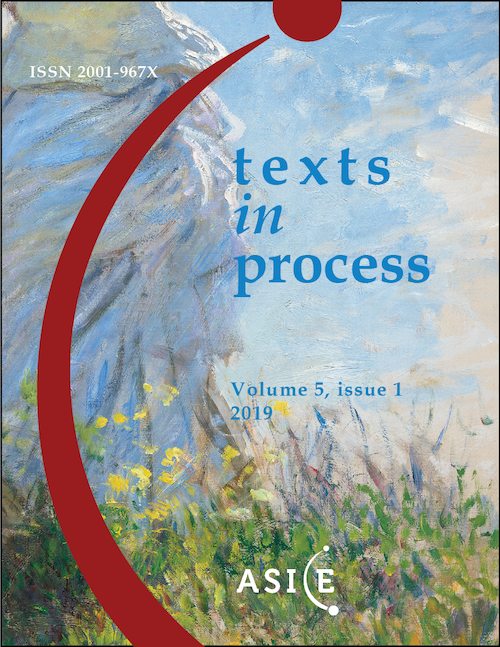Linguistic ideologies of students entering an Argentine university
Abstract
This work is part of the PROAPI Research Project “Reading and writing in the initial cycle of the Universidad Nacional de Avellaneda”. One of the axes developed in it is linguistic diversity in relation to academic writing processes. A significant percentage of our students are in a situation of languages in contact, they can even be considered bilingual in a broad sense (Speranza, 2012). Considering these specificities in the academic field helps prevent linguistic differences from becoming linguistic inequality with the consequence of abandonment of university studies. Therefore, in the first stage of the investigation, we conducted a survey of incoming students, whose partial result we are interested in exhibiting in this work. One of the questions was to describe with a word or phrase a list of languages that were offered in order to identify linguistic ideologies (del Valle, 2007). From the analysis carried out, it is observed that the predominant linguistic ideologies on the Quechua and Guaraní languages are built, on the one hand, in negative terms of emptiness and enigma, as an unknown terrain of which little and nothing can be said, and on the other, in terms affirmative based on the ideas of ethnicity and foreigners.
Downloads
References
Indec (2015). Censo Nacional de Población, Hogares y Viviendas 2010. Censo del Bicentenario, Pueblos Originarios: Región Metropolitana, Serie D N° 6. Recuperado de https://www.indec.gob.ar/indec/web/Nivel4-Tema-2-21-99
de Arnoux, Elvira Narvaja, and José Del Valle (2010). "Las representaciones ideológicas del lenguaje: discurso glotopolítico y panhispanismo", en Spanish in Context, 7(1), pp. 1-24.
de Arnoux, Elvira (2000) “La Glotopolítica: transformaciones de un campo disciplinario”, en Primer Simposio en la Maestría en Ciencias del Lenguaje, Instituto de Educación Superior “Joaquín V. González.
Declaración Final de la Conferencia Regional de Educación Superior en América Latina y El Caribe, Cartagena de Indias, Colombia, 2008
Declaración de la III Conferencia Regional de Educación Superior para América Latina y el Caribe (CRES), Córdoba, Argentina, 14 de junio de 2018. Disponible en: http://espacioenlaces.org/wp-content/uploads/2018/07/declaracion_cres2018.pdf
Del Valle, José (2007). La lengua, ¿patria común? Ideas e ideologías del español. Madrid: Vervuert-Iberoamericana.
Del Valle, J. y Merinho-Guede, V. (2016). “Ideologías lingüísticas” en Javier Gutiérrez-Rexach (ed.). Enciclopedia de Lingüística Hispánica. New York: Routledge.
Godenzzi, J. (2007). “Ciudadanía intercultural y política de lenguas: perspectiva latinoamericana”, en Signo & Seña Nº 18, Facultad de Filosofía y Letras, Universidad de Buenos Aires.
Golluscio, L. y Ciccone, G. (2017). Material de consulta para el docente en contextos de diversidad lingüística. Estructuras contrastivas guaraní-español / quechua-español. Buenos Aires, Facultad de Filosofía y Letras, Universidad de Buenos Aires.
Juliano, D. (1998). “Universal/particular, un falso dilema” En: Bayardo, R. Y Lacarrieu, M. (Comps.) Globalización e identidad cultural. Buenos Aires, Ediciones CICCUS.
Martínez, A. y Adriana Speranza (2009). “¿Cómo analizar los fenómenos de contacto lingüístico?: Una propuesta para ver el árbol sin perder de vista el bosque” En: Lingüística. Volumen 21 N° 1. Revista de la ALFAL: 87-107.
Mato, D. (2016). “Educación Superior y Pueblos Indígenas y Afrodescendientes en América Latina.Interpelaciones, avances, problemas, conflictos y desafíos”, en Mato, D. (coord.), Educación Superior y Pueblos Indígenas en América Latina, Experiencias, interpelaciones y desafíos, Ed. UNTREF, Provincia de Buenos Aires.
Pozzo, M. I. (2009). “La enseñanza de lenguas extranjeras en Argentina”, Diálogos Latinoamericanos Vol. 15, Disponible en: https://www.redalyc.org/pdf/162/16220868002.pdf Fecha de consulta: 2 de octubre de 2019.
Speranza, A. (2014). Estudios lingüísticos para comunicación social. La evidencialidad en el discurso periodístico. Moreno, Universidad Nacional de Moreno.
Speranza, Adriana (Coord.), Guillermo Fernández y Marcelo Pagliaro (2012). Identidades lingüísticas y culturales en contexto educativos. Buenos Aires, Imprex Ediciones.
Todorov, T. (2005). La conquista de América. El problema del otro. Buenos Aires, Siglo XXI.

Copyright (c) 2019 Julieta Gurvit, Ivana Casas, Paola Viviana Pereira

This work is licensed under a Creative Commons Attribution 4.0 International License.
Texts in Process (TEP) is a non-commercial open-access scholarly journal governed by a Creative Commons Recognition 4.0 International license. It follows a full and unrestricted open access, without charges or fees for shipping, reviewing, processing and publishing articles. Users can read, download without registering, distribute, print or link the complete texts of numbers and articles, without the permission of the editors or authors. There is also no charge to publish (APCs), being applicable to the entire editorial process. The authors retain their intellectual rights at all times.
ASICE-EDICE Programme has always believed that non-commercial, open, unlimited and unrestricted access to specialized academic publications is a vehicle for academic freedom and scientific rigor. It adheres and shares the Declaration of Mexico and DORA to guarantee the protection of academic and scientific production in Open Access.
















